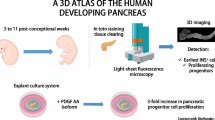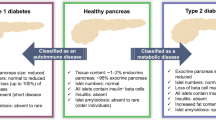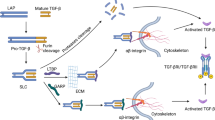Summary
Background. The pancreas harbors growth factors such as the epidermal growth factor (EGF) family. The physiological and pathophysiological roles of growth factors in normal pancreas remain unsettled. Human pancreatic cancer overexpresses the EGF receptor, and the ligands EGF and transforming growth factor alpha (TGF-α). The aim of the present experiments was to study the effect of TGF-α in a pancreatic cancer cell line and in normal mouse pancreas.
Method. The LN-36 cell line, established from a pancreatic duct cell adenocarcinoma, was incubated with TGF-α or EGF. The effect of an EGF receptor-specific, tyrosine kinase inhibitor (tyrphostin B56) with or without growth factors was also studied. The cell number was measured with the XTT-colorimetric method. TGF-α, the tyrphostins A25, B48, and B56, were in separate experiments infused during 1 wk to normal female mice by subcutaneous (sc) minipumps.
Results. The LN-36 cell line responded to TGF-α and EGF with increased cell number; +61% with 10−10M TGF-α and +34% with 10−9M EGF. Tyrphostin B56 at a concentration of 10−5M reduced the cell number by 76%, but when incubated together with growth factors the reduction was only 44% with TGF-α, and 39% with EGF. Infusion of TGF-α increased mouse pancreatic wet weight and protein content but was without effect on DNA synthesis, measured as incorporation of tritiated thymidine. Infusion of three different tyrphostins did not influence mice pancreas.
Conclusion. The results support the role of TGF-α to maintain growth of pancreatic cancer cells by the EGF receptor. Infusion of TGF-α induced hypertrophy in normal mouse pancreas.
Similar content being viewed by others
References
Liebow C, Hierowski MT, duSpain K. Hormonal control of pancreatic cancer growth. Pancreas 1986; 1: 44–48.
Smith JJ, Derynck R, Korc M. Production of transforming growth factor α in human pancreatic cancer cells: evidence for a superagonist autocrine cycle. Proc Natl Acad Sci USA 1987; 84: 5141–5144.
Ohmura E, Okada M, Onoda N, Kamiya Y, Murakami H, Tsushima T, Shizume K. Insulin like growth factor I and transforming growth factor alpha as autocrine growth factors in human pancreatic cancer cell growth. Cancer Res 1990; 50: 103–107.
Chen YF, Pan GZ, Hou X, Liu TH, Chen J, Yanaihara C, Yanaihara N. Epidermal growth factor and its receptors in human pancreatic carcinoma. Pancreas 1990; 5: 278–283.
Beuchamp RD, Lyons RM, Yang EY, Coffey Jr RJ, Moses HL. Expression of and response to growth regulatory peptides by two human pancreatic carcinoma cell lines. Pancreas 1990; 5: 369–380.
Aaronson SA. Growth factors and cancer. Science 1991; 254: 1146–1153.
Lemoine NR, Hughes CM, Barton CM, Poulson R, Jeffery RE, Kloppel G, et al. The epidermal growth factor receptor in human pancreatic cancer. J Pathol 1992; 166: 7–12.
Korc M, Chandrasekar B, Yamanaka Y, Friess H, Buchler M, Beger H. Overexpression of the epidermal growth factor receptor in human pancreatic cancer is associated with concomitant increases in the levels of epidermal growth factor and transforming growth factor alpha. J Clin Invest 1992; 90: 1352–1360.
Ro JSM, North GE, Gallick GN, Hortobagyi JU, Gutterman, Blick M. Amplified and overexpressed epidermal growth factor receptor gene in uncultured primary human breast carcinoma. Cancer Res 1987; 48: 161–164.
Poston GJ, Gillespie J, Guillou PJ. Biology of pancreatic cancer. Gut 1991; 32: 800–812.
Kobari M, Kullenberg B, Matsuno S, Björkman A, Ihse I, Axelson J. The inhibitory effect of an EGF receptor specific tyrosine kinase inhibitor on the growth of pancreatic cancer cell lines was more potent than inhibitory antibodies against the receptors for EGF and IGF-I. Int J Pancreatol 1998; 24: 85–95.
Korc M, Magun BE. Recycling of epidermal growth factor in a human pancreatic carcinoma cell line. Proc Natl Acad Sci USA 1985; 82: 6172–6175.
Korc M. Regulation of pancreatic cancer cell proliferation by an autocrine cycle coupled to the epidermal growth factor receptor. Pancreas 1989; 4: 262–263.
Korc M, Chandrasekar B, Shah GN. Differential binding and biological activities of epidermal growth factor and transforming growth factor α in a human pancreatic cancer cell line. Cancer Res 1991; 51: 6243–6249.
Yamanaka Y, Friess H, Kobrin MS, Büchler M, Beger HG, Korc M. Coexpression of epidermal growth factor receptor and ligands in human pancreatic cancer is associated with enhanced tumor aggressiveness. Anticancer research 1993; 13: 565–570.
Barton CM, Hall PA, Hughes CM, Gullick WJ, Lemoine NR. Transforming growth factor alpha and epidermal growth factor in pancreatic cancer. J Pathol 1991; 163: 111–116.
Ikematsu Y, Pour PM, Kazakoff K. species differences in the expression of transforming growth factor-alpha (TGF-α) in the submandibular gland and pancreas. Int J Pancreatol 1997; 22: 111–119.
Jhappan C, Stahle C, Harkins RN, Fausto N, Smith GH, Merlino GT. TGF alpha overexpression in transgenic mice induces liver neoplasia and abnormal development of the mammary gland and pancreas. Cell 1990; 61: 1137–1146.
Axelson J, Håkanson R, Ihse I, Lilja I, Rehfeld JF, Sundler F. Effects of endogenous and exogenous CCK and infusion with cholecystokinin antagonist L364,718 on pancreatic and gastrointestinal growth. Scand J Gastroenterol 1990; 25: 471–480.
Ohlsson B, Borg K, Rehfeld JF, Ihse I, Axelson J. The effect of intermittent injections of CCK-8S and the CCK-Areceptor antagonist devazepide on cell proliferation in exocrine rat pancreas. Int J Pancreatol 1998; 24: 211–218.
Ohlsson B, Jansen C, Ihse I, Axelson J. Epidermal growth factor induces cell proliferation in mouse pancreas and salivary glands. Pancreas 1997; 14: 94–98.
Bardi G, Aman P, Johansson B, Pandis N, Mandahl N, Jensen EB, et al. Cytogenic characterization of a periampullary adenocarcinoma of the pancreas, its liver metastasis, and a cell line established from the metastatis in a patient with Gardners syndrome. Cancer Genet Cytogenet 1994; 75: 29–32.
Roehm NW, Rodgers GH, Hatfield SM, Glasebrook AL. An improved colorimetric assay for cell proliferation and viability utilizing the tetrazolium salt XTT. J Immunol Methods 1991; 142: 257–265.
Lowry OH, Rosebrough NJ, Farr AL, Randall RJ. Protein measurement with the folin phenol reagent. J Biol Chem 1951; 195: 265–275.
Fredäng N, Jonson T, Höglund M, Axelson J. Expression of the EGF receptor family in pancreatic cancer and effects of EGF and TGF-alpha on fresh cell cultures in vitro. In press.
Bockman DE, Merlino G. Cytological changes in the pancreas of transgenic mice overexpressing transforming growth factor alpha. Gastroenterology 1992; 103: 1883–1892.
Yoneda T, Lyall RM, Alsina MM, Persons PEP, Spada AP, Levitzki A, et al. The antiproliferative effects of tyrosin kinase inhibitors tyrphostins on a squamous cell carcinoma in vitro and in nude mice. Cancer Res 1991; 51: 4430–4435
Author information
Authors and Affiliations
Rights and permissions
About this article
Cite this article
Kullenberg, B., Jansen, C., Fredäng, N. et al. Transforming growth factor alpha (TGF-α) increases cell number in a human pancreatic cancer cell line but not in normal mouse pancreas. International Journal of Pancreatology 28, 199–205 (2000). https://doi.org/10.1385/IJGC:28:3:199
Received:
Revised:
Accepted:
Issue Date:
DOI: https://doi.org/10.1385/IJGC:28:3:199




